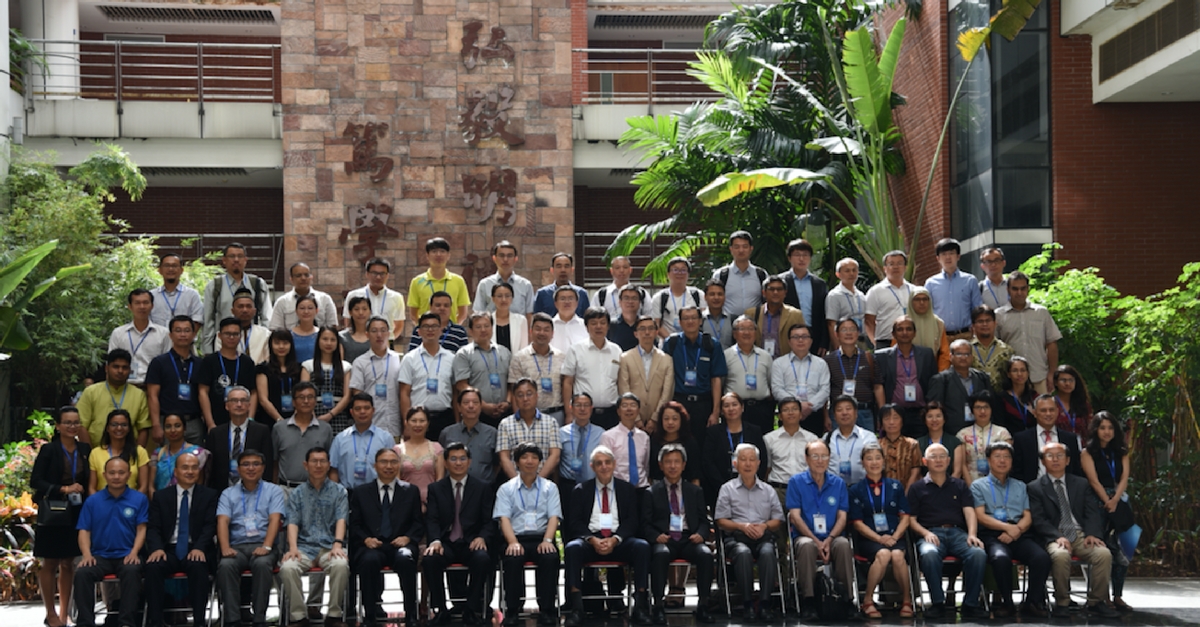 Participants and organizers of the conference held in Guangzhou as a part of celebrating the 90th anniversary of Jinan University's Academy of Overseas Chinese Studies and Department of Nanyang Culture and Education. Professor Baviera is on the second row from the front and eighth from the right.
Participants and organizers of the conference held in Guangzhou as a part of celebrating the 90th anniversary of Jinan University's Academy of Overseas Chinese Studies and Department of Nanyang Culture and Education. Professor Baviera is on the second row from the front and eighth from the right.
.....People-to-people relations and tourism cooperation were the topics Dr Baviera was asked to speak on at the 5th China-South and Southeast Asia Think Tank Forum, held in Kunming, Yunnan province. The forum, which featured China specialists from various countries in South Asia and Southeast Asia, discussed measures to promote bilateral and subregional cooperation on infrastructure and other areas under the framework of China’s Belt and Road Initiative. It was organized by the Yunnan Academy of Social Sciences, together with the Chinese (Kunming) Academy of South and Southeast Asian Studies, and held from June 12 to 13.
In Guangzhou, Professor Dai Fan, one of Jinan University’s experts on overseas Chinese in the Philippines and formerly a research fellow of the Asian Center, University of the Philippines, invited Dr Aileen Baviera to participate in a panel discussion marking the 50th anniversary of ASEAN, held as part of a conference celebrating the 90th anniversary of both the university’s Academy of Overseas Chinese Studies and its Department of Nanyang Culture and Education. Also in the ASEAN panel, held July 15, were Prof Anthony Reid, Dr Lu Jianren of Guangxi University and other well-known Chinese scholars of Southeast Asian studies. Jinan University in Guangzhou was the first university in China to set up a program on overseas Chinese studies.
From the conference in Guangzhou, Dr. Baviera proceeded to Shanghai, where the Shanghai Institute for International Studies had organized two closed-door meetings from July 17 to 19. The first meeting considered the emerging regional security architecture in East Asia and the role of the East Asia Summit, while the second examined recent developments on Taiwan and their implications for China-Southeast Asia relations. Both meetings were presided over by SIIS president Prof. Chen Dongxiao.
The visit to Shanghai also provided Dr Baviera an opportunity to once more meet with Dr Li Kaisheng of the Shanghai Academy of Social Sciences for informal exchanges. It may be recalled that SASS scholars including Dr. Li were guests at a roundtable on Philippines-China relations and the Belt and Road Initiative, organized by APPFI last February.
As co-editor of a 5-volume book series published by the Economic Research Institute of ASEAN and East Asia (ERIA) and the Philippine Department of Foreign Affairs marking ASEAN’s fiftieth anniversary, Dr Baviera participated in a high-level symposium on the ASEAN Political-Security Community that was held in June in Iloilo. The symposium was co-organized by ERIA - represented by its President Hidetoshi Nishimura and project head Dr Ponciano Intal, the University of the Philippine Visayas, and the Iloilo-based ASEAN Research Institute for Strategic Studies and Enterprise headed by Dr Kevin Villanueva. Dr Baviera spoke on the challenges to ASEAN centrality, the subject of her lead essay in this issue of the APPFI newsletter.
The preceding article was originally published in the Asia Pacific Pathways for Progress Foundation, Inc with the title, "ASEAN-China Relations Takes the Stage in Track Two Dialogues."
ABOUT PROFESSOR BAVIERA
Dr. Aileen SP. Baviera is Professor at the Asian Center, University of the Philippines Diliman. She specializes on and writes about contemporary China studies, China-Southeast Asia relations, Asia-Pacific security, territorial and maritime disputes, and regional integration. The editor in chief of the journal, "Asian Politics & Policy," she is the author of many academic publications, including the "The Domestic Mediations of China's Influence in the Philippines," which appears in Rising China's Influence in Developing Asia, edited by Evelyn Goh and published by Oxford University Press. She completed her Ph.D. in Political Science at the University of the Philippines Diliman. VIEW FULL PROFILE.
The UP Asian Center offers M.A. degrees in Asian Studies with four fields of specialization: Northeast Asia, Southeast Asia, South Asia, and West Asia. The Center also has an M.A. program in Philippine Studies that allows students to major in Philippine society and culture, Philippine foreign relations, or Philippine development studies. The Center offers a Ph.D. program in Philippine Studies in conjunction with the College of Arts and Letters and the College of Social Sciences and Philosophy. Get an overview of these programs. The Asian Center also houses a peer-reviewed, open-access journal, Asian Studies: Journal of Critical Perspectives on Asia. It has published several books and monographs, and hosts or organizes various lectures and conferences.

